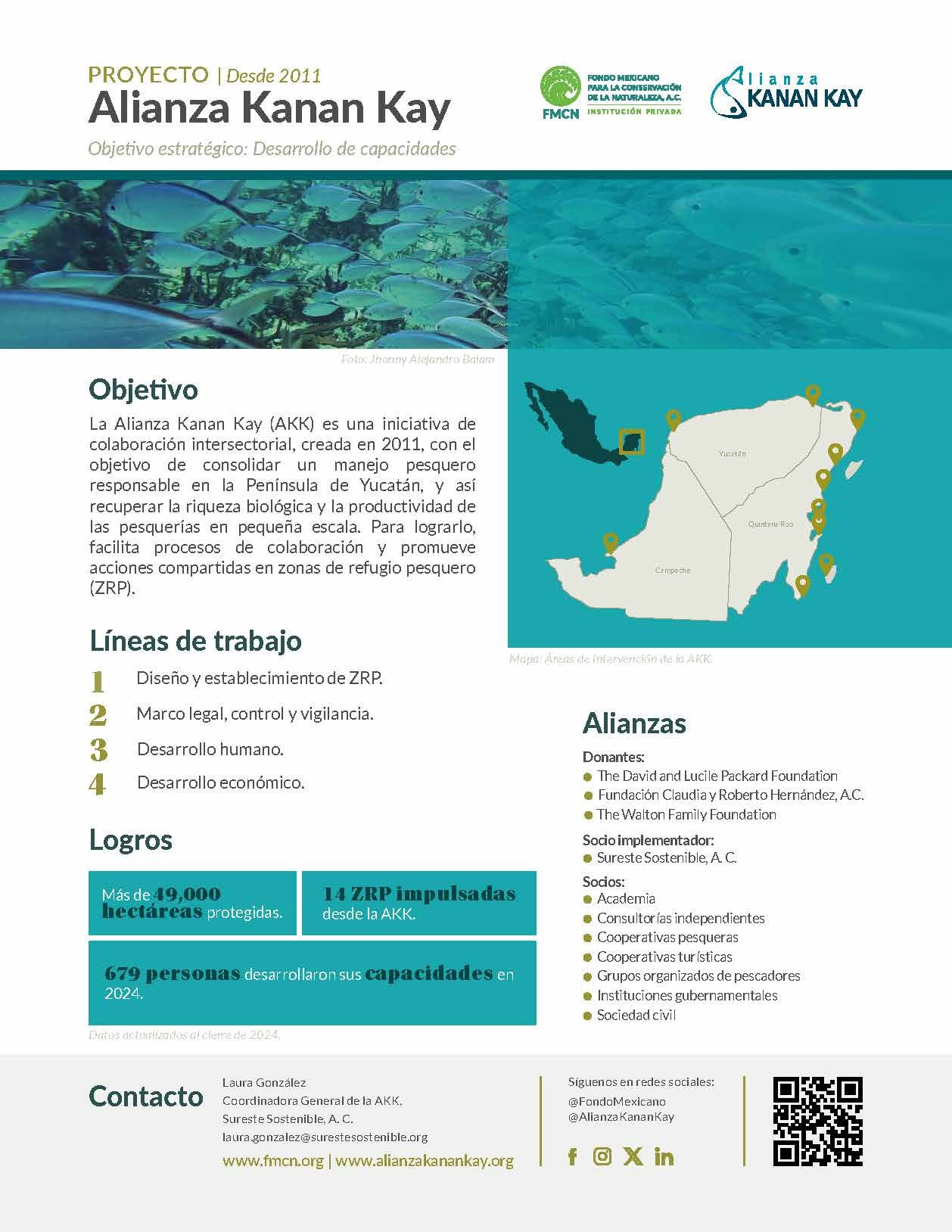Kanan Kay Alliance
Strengthening sustainable fishing practices in southeastern Mexico
The Project
The Kanan Kay Alliance (AKK, acronym in Spanish) is an cross-sectoral colllaboration initiative aimed at establishing responsible fisheries management in the Yucatán Peninsula to restore the biological richness and productivity of small-scale fisheries. To achieve this, it facilitates collaborative processes and promotes joint actions in fishing refuge zones (FRZ).
Its name, which means "Guardian of the Fish" in the Mayan language, reflects its commitment to the conservation of marine ecosystems and the sustainable development of fishing communities.
Context
The Mesoamerican Reef System (MAR) is the most important reef in the western hemisphere; it extends for more than 1,000 km along the coasts of Mexico, Belize, Guatemala, and Honduras. The health of the MAR is critically threatened by overfishing, algal blooms on corals, water pollution, and global warming.
Despite regulatory efforts in the marine-coastal zones of the Yucatan Peninsula, fishery production of some commercially and ecologically valuable species continues to decline significantly. The Healthy Reefs for Healthy People Initiative (HRI) 2022 report reveals that the Reef Health Index (RHI) has fallen again; 44% of sites are in a "Poor" condition, and "Critical" sites have doubled (now 31%) since the last report.
Fish populations are now critically low in all countries except Mexico. Cozumel is the only sub-region with "Very Good" conditions for commercial and herbivorous fish, with grouper and snapper biomass five times the regional average. This site has had the highest percentage of its area fully protected for decades (35%), so these data demonstrate the value of complete protection, particularly when local communities are involved in the management and benefit economically.
The Kanan Kay Alliance seeks to contribute to the consolidation of responsible fisheries management to recover the biological wealth and productivity of small-scale fisheries in the Yucatan Peninsula by facilitating collaborative processes and shared actions through FRZs. FRZs are areas that contribute to the development of fishing resources since they allow the reproduction and recovery of commercially important fishing species and other marine species, improving the well-being of the communities that depend on these resources and conserving marine biodiversity. Furthermore, they are an instrument of the National Fisheries Policy, which may be part of the subzoning of a protected natural area or be within it.
Its operation is based on protecting critical habitats, especially breeding, feeding, and nursery areas. These actions lead to the "spillover effect," i.e., the repopulation of species of commercial and ecological interest in nearby fishing areas.
The lines of work that guide the actions of the AKK are:
- Design and establishment of FRZs: contribute in a coordinated manner to the recovery of artisanal fisheries and their habitats in the Yucatán Peninsula through knowledge sharing, monitoring and support in the establishment of FRZs.
- Legal framework, control, and monitoring: use the regulatory and institutional framework to decree, inspect, and monitor FRZs in collaboration with fishing cooperatives and implement the most effective fisheries management tools.
- Human development: promote the strengthening of individual and collective capacities within coastal communities and local organizations to support the recovery of fisheries and their habitats in the Yucatán Peninsula.
- Economic development: promote local actions that enhance the perceived well-being of coastal communities through the sustainable use of marine and coastal resources, as well as the diversification of economic activities.
FRZs are no-fishing areas that allow for the reproduction and recovery of marine species.
Learn more about FRZ.
Achievements
The Alliance manages 14 FRZs, covering 49,980 hectares of protected marine ecosystems, and leads initiatives to improve living conditions in coastal communities of the Yucatán Peninsula. Its experience demonstrates that collaborative management is essential to address current challenges and build a more resilient and equitable future.
In 2024, AKK consolidated key advances in community governance, marine conservation, and sustainable development in the Yucatán Peninsula. Over the course of the year, more than 70 exchange activities were carried out, including talks, workshops, events, monitoring efforts, and training sessions, with the participation of over 1,000 people (976 men and 329 women). Additionally, five new members joined the Alliance. These activities helped raise awareness and strengthen local capacities for responsible fisheries management.
Five biological monitoring activities were carried out in key sites such as Celestún, Banco Chinchorro, Isla Aguada, and Xcalak, improving knowledge about the state of marine ecosystems. Furthermore, progress was made toward the establishment of a new FRZ in the Santuario del Manatí State Reserve, with active community participation.
Allies
Donors:
- The David and Lucile Packard Foundation
- Fundación Claudia y Roberto Hernández
- The Walton Family Foundation
Partners:
- Sureste Sostenible, A.C.
- Academia
- Independent consultants
- Fishing cooperatives
- Tourism cooperatives
- Organized groups of fishers
- Governmental institutions
- Civil society
Follow AKK on FB!
